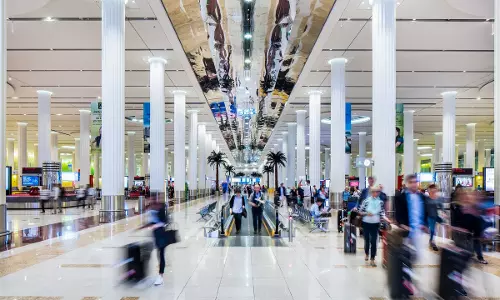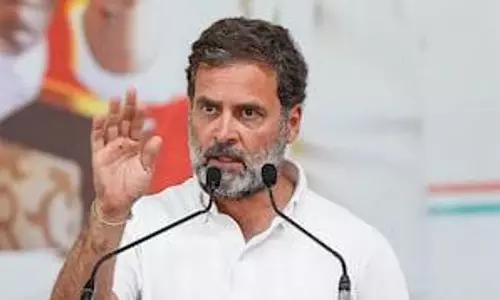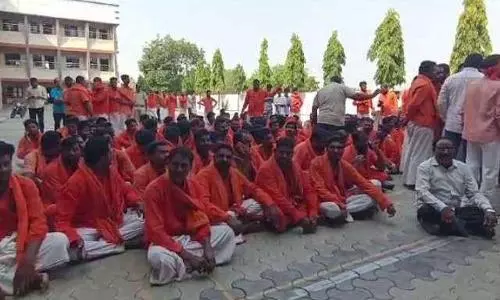
Parallels of injustice: from Walayar to Palathayi
text_fieldsIt was on 13 January 2017 that in Attappallam near Walayar in Palakkad district, a 13-year old girl was found hanging dead in a single-room house. Despite ample circumstantial evidence of it being a murder, the initial police attempt was to let it pass for a suicide. The girl's nine-year old sister had given a statement to the police that on the night of the death, she had seen two men in veil going out of the house. Not only that the police did not take this statement at face value, they were not prepared either to provide adequate security to their mother despite death threat prevailing against her. After 51 days, the second girl also died in similar circumstances which was again portrayed as a suicide.
Only after the release of the post-mortem report showing both girls were subjected to sesxual abuse prior to death, did the government and the home department come out with remedial steps. It was after that the officials of the earlier investigation were replaced by a new, expanded team and the probe gained some momentum. But by that time it was too late. Although the accused were charged for offences including under POCSO provisions, the prosecution failed in proving the crime beyond doubt resulting in the trial court acquitting the accused. Many had pointed out from the very beginning the police's serious failure in recording witness statements which could have led to a conviction of the culprits. The police laxity can be easily gauged from the fact that in the case of the first murder, even her mother's statement was missing in the records submitted before the court. In the process, the appearance of the chairman of the Child Welfare Committee for the accused, also became a subject of much controversy.
Chief minister Pinarayi Vijayan, who is also the home minister, himself had to confess that the girls in the Walayar case did not get justice and that there were serious lapses on the part of the investigating officials. He assured that the government would not oppose CBI enquiry into the incident. The government also became ready to file a petition against the trial court verdict, in the High Court together with the girls' mother. Former judge of Vigilance Tribunal PK Haneefa was appointed to probe into the failure of the police in the preliminary investigation. However, if a re-probe was ordered, say legal experts, the charge sheet was so weak that the earlier charges slapped against the accused could not be invoked against the accused. As for the report of judge Haneefa, even though it admits the the failure in the probe, it also made an attempt to white wash the officers. In short, there is little hope for those girls to secure justice. Nor does the government now show the initial interest. And popular protests for justice now stand suspended because of the lockdown.
Fast forward to Palathayi case in Kannur district, the grant of bail yesterday to Padmarajan in the sexual abuse case, confirms that this case is also taking the same course as of Walayar. It was in the third week of last March that a case was filed under POCSO provisions by child-line workers against Padmarajan, a teacher and a BJP leader. The charge was that a fourth standard girl of his school was subjected to sexual abuse several times in the wash room and other places. Althouth a complaint was received about such a grave crime, the accused was arrested only after a month. And the Crime Branch, which took over the investigation, dragged the investigation and delayed the charge sheet until the last minute. Following strong interventions by different political parties and voluntary orgaisations, at least a partial charge sheet was submitted on the 90th day from the arrest. But again, the charge sheet fell short of slapping serious charges including POCSO, and invoked only minor sections, even as there were clear evidence and statements; it is patently not intended to get the accused the punishment he deserved, on the excuse that more scientific investigations were required for applying POCSO. But as has already been pointed out by many, by the time such a scientific probe would be complete, the accused would escape. It needs special mention that it is in the constituency of health minister KK Shylaja teacher, who is also in charge of women and community welfare that the police is providing shelter to a sangh parivar worker. The silence and slackness of the government and the ruling party certainly serve to prepare an escape route for the culprit, as in the case of Walayar.
The diluted partial charge sheet and the bail obtained by the accused under it give credence to the allegation that the home department is functioning in complete subservience to the sangh parivar. Given the fact that despite being charged under POCSO the culprits of Walayar had escaped, the outcome of the Palathayi case is an easy guess. It needs to be highlighted that in both places the victims of crime were from families of marginalised sections. And on all such occasions, one cannot miss a common spectacle of our mainstream politicians uniting as one in favour of the accused, forgetting all their differences. There are those however, who fight for justice in Walayar and Palathayi, to expose this iniquitous political consolidation and to bring the accused before law. What those committed to humanity have to do is to stand by them at any cost.























